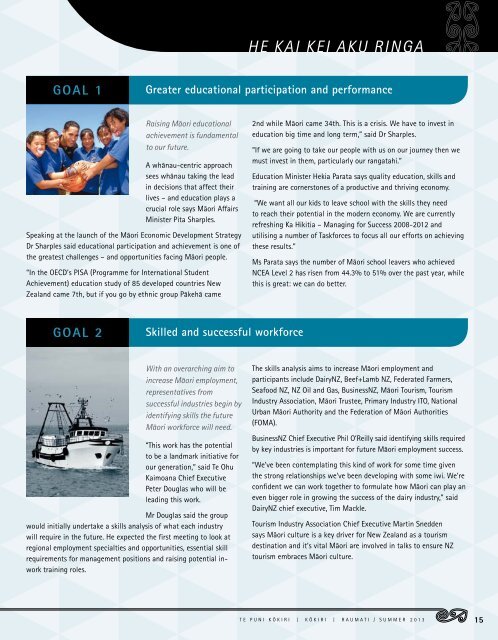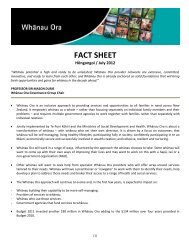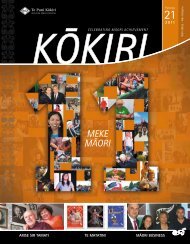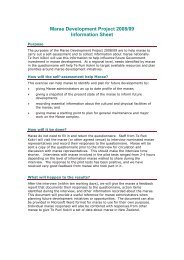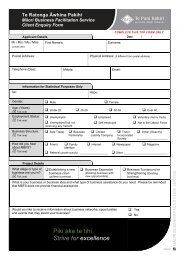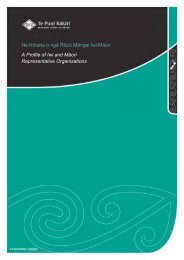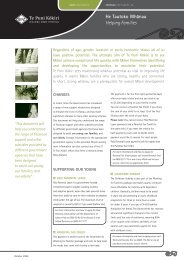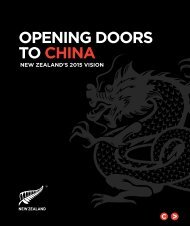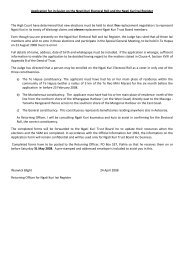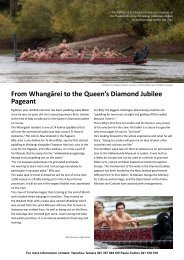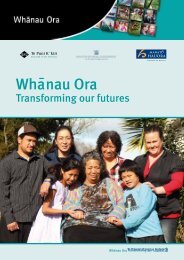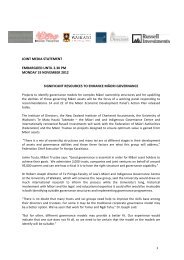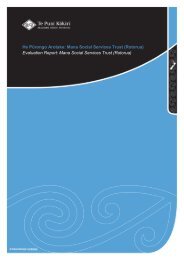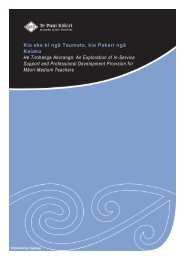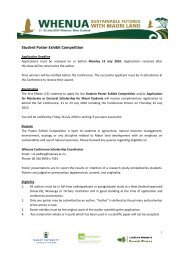Download the PDF (5.1MB) - Te Puni Kokiri
Download the PDF (5.1MB) - Te Puni Kokiri
Download the PDF (5.1MB) - Te Puni Kokiri
Create successful ePaper yourself
Turn your PDF publications into a flip-book with our unique Google optimized e-Paper software.
HE KAI KEI AKU RINGA<br />
GOAL 1<br />
Greater educational participation and performance<br />
Raising Mäori educational<br />
achievement is fundamental<br />
to our future.<br />
A whänau-centric approach<br />
sees whänau taking <strong>the</strong> lead<br />
in decisions that affect <strong>the</strong>ir<br />
lives – and education plays a<br />
crucial role says Mäori Affairs<br />
Minister Pita Sharples.<br />
Speaking at <strong>the</strong> launch of <strong>the</strong> Mäori Economic Development Strategy<br />
Dr Sharples said educational participation and achievement is one of<br />
<strong>the</strong> greatest challenges – and opportunities facing Mäori people.<br />
“In <strong>the</strong> OECD’s PISA (Programme for International Student<br />
Achievement) education study of 85 developed countries New<br />
Zealand came 7th, but if you go by ethnic group Päkehä came<br />
2nd while Mäori came 34th. This is a crisis. We have to invest in<br />
education big time and long term,” said Dr Sharples.<br />
“If we are going to take our people with us on our journey <strong>the</strong>n we<br />
must invest in <strong>the</strong>m, particularly our rangatahi.”<br />
Education Minister Hekia Parata says quality education, skills and<br />
training are cornerstones of a productive and thriving economy.<br />
“We want all our kids to leave school with <strong>the</strong> skills <strong>the</strong>y need<br />
to reach <strong>the</strong>ir potential in <strong>the</strong> modern economy. We are currently<br />
refreshing Ka Hikitia – Managing for Success 2008-2012 and<br />
utilising a number of Taskforces to focus all our efforts on achieving<br />
<strong>the</strong>se results.”<br />
Ms Parata says <strong>the</strong> number of Mäori school leavers who achieved<br />
NCEA Level 2 has risen from 44.3% to 51% over <strong>the</strong> past year, while<br />
this is great: we can do better.<br />
GOAL 2<br />
Skilled and successful workforce<br />
With an overarching aim to<br />
increase Mäori employment,<br />
representatives from<br />
successful industries begin by<br />
identifying skills <strong>the</strong> future<br />
Mäori workforce will need.<br />
“This work has <strong>the</strong> potential<br />
to be a landmark initiative for<br />
our generation,” said <strong>Te</strong> Ohu<br />
Kaimoana Chief Executive<br />
Peter Douglas who will be<br />
leading this work.<br />
Mr Douglas said <strong>the</strong> group<br />
would initially undertake a skills analysis of what each industry<br />
will require in <strong>the</strong> future. He expected <strong>the</strong> first meeting to look at<br />
regional employment specialties and opportunities, essential skill<br />
requirements for management positions and raising potential inwork<br />
training roles.<br />
The skills analysis aims to increase Mäori employment and<br />
participants include DairyNZ, Beef+Lamb NZ, Federated Farmers,<br />
Seafood NZ, NZ Oil and Gas, BusinessNZ, Mäori Tourism, Tourism<br />
Industry Association, Mäori Trustee, Primary Industry ITO, National<br />
Urban Mäori Authority and <strong>the</strong> Federation of Mäori Authorities<br />
(FOMA).<br />
BusinessNZ Chief Executive Phil O’Reilly said identifying skills required<br />
by key industries is important for future Mäori employment success.<br />
“We’ve been contemplating this kind of work for some time given<br />
<strong>the</strong> strong relationships we’ve been developing with some iwi. We’re<br />
confident we can work toge<strong>the</strong>r to formulate how Mäori can play an<br />
even bigger role in growing <strong>the</strong> success of <strong>the</strong> dairy industry,” said<br />
DairyNZ chief executive, Tim Mackle.<br />
Tourism Industry Association Chief Executive Martin Snedden<br />
says Mäori culture is a key driver for New Zealand as a tourism<br />
destination and it’s vital Mäori are involved in talks to ensure NZ<br />
tourism embraces Mäori culture.<br />
T E P U N I K ö K I R I | K ö K I R I | R A U M A T I / S U M M E R 2 0 1 3<br />
15


